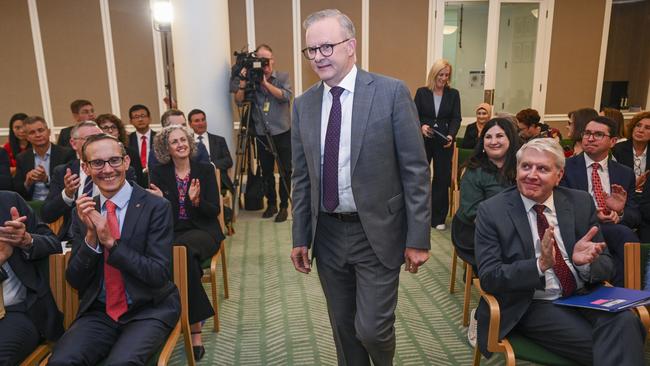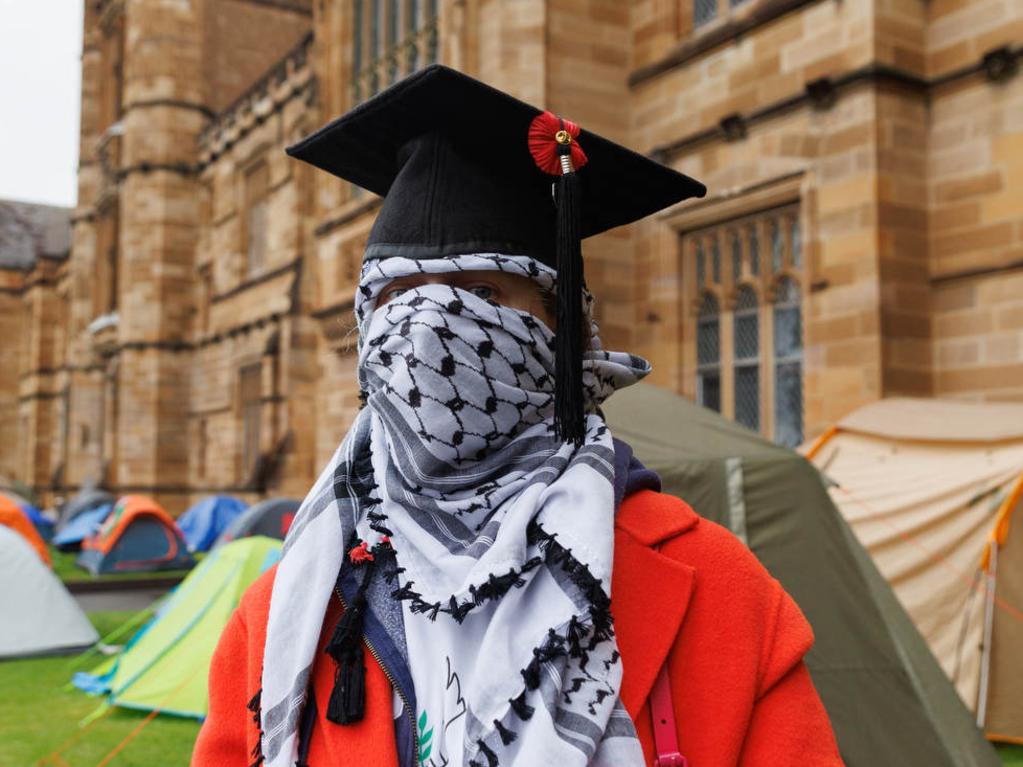Anti-Semitism the worst it’s been in my lifetime, Anthony Albanese says
Anthony Albanese says that anti-Semitism is being expressed more openly now than at any other point in his life, just days after Australia voted to upgrade Palestine’s UN status.

Anthony Albanese has told the Labor caucus that anti-Semitism was being expressed more openly than at any other time in his lifetime in response to a question from an MP concerned about rising hate speech towards Jews, including on university campuses.
NSW Labor Senator Deborah O’Neill raised the question in a caucus meeting on Monday afternoon, just days after Australia voted in favour of Palestine’s bid to upgrade its UN states on Saturday.
Addressing caucus, the Prime Minister praised the performance of Foreign Minister Penny Wong in responding to the unfolding Middle East crisis as “extraordinary” but said the issue was not a simple one.
Mr Albanese said that every life mattered in the Gaza war, reaffirmed the government’s support for a two state solution and that Labor needed to maintain its principled stance on the conflict.
However, when pressed by Senator O’Neill on rising anti-Semitism, the Prime Minister said there was “no question” that anti-Semitism was being expressed more openly than at any other point in his lifetime.
Labor MP for Macnamara, Josh Burns, also issued a statement on the weekend saying that he believed Australia should have abstained from the vote noting that Hamas were still holding more than 130 hostages and remained the governing authority in Gaza.
One Labor MP told The Australian the Prime Minister was concerned people did not understand the history of anti-Semitism and believed the Jewish community needed to be supported.
The vote by Australia in the UN General Assembly in favour of the resolution to upgrade the status of Palestine was at odds with the US, which voted no, and the UK and Canada, which abstained. The resolution contained no call for the removal of Hamas from Gaza or the release of Israeli hostages.
Senator Wong said 143 countries backed the resolution. She said the resolution retained the observer status of the Palestinian mission, with the “extension of some modest additional rights to participate in the United Nations forums”.
“It did not give the Palestinian mission membership of the United Nations. It did not give the Palestinian mission voting rights at the General Assembly,” she said. “What it did do, consistent with a two state solution, was to express the General Assembly’s aspiration for Palestinian membership of the United Nations, noting that this must be recommended by the UN Security Council, consistent with the UN Charter.”
“It did not indicate the United Nations or Australia recognised a Palestinian state.”
But Australia/Israel & Jewish Affairs Council, Colin Rubenstein, said on Monday the vote was “profoundly disappointing and completely misguided as a way to advance Israeli-Palestinian peace”.
“Hamas must have no future role in governing Gaza, not least because it is irredeemably and militantly opposed to any two-state peace. Yet there is no doubt whatsoever that many Palestinians see UN recognition of ‘Palestine’ as a major national achievement made possible by Hamas’ wave of barbaric mass violence on October 7,” he said.
“We are also out of step with our key allies. This includes the US, Argentina, Papua New Guinea and Czechia, which voted against, and the UK, Canada, Germany, Italy, Sweden, Ukraine, Fiji, and the Netherlands, which abstained, all clearly recognising the very counter-productive effects of this UN resolution.”
Opposition foreign affairs spokesman Simon Birmingham said on Monday that the vote represented a “profound shift” in Australia’s position.
“They’ve shifted the position in relation to a negotiated two-state solution to instead one where the government is telegraphing that a two-state solution could and should come before settlement of difficult questions,” he said. “Like what the borders would look like? What security guarantees are given between the two states? What rights of return look like? These are all fundamental issues that parties have long accepted need to be resolved and addressed to be able to achieve a secure, negotiated, two-state solution that can be enduring and lasting.”







To join the conversation, please log in. Don't have an account? Register
Join the conversation, you are commenting as Logout